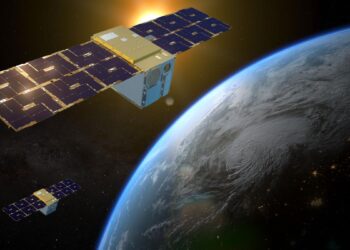Russian space boosted after French courts unfreeze receivables
French courts have unfrozen US$700m in receivables Eutelsat and Arianespace owed to the Russian space sector. The sum had been swept up by lawyers looking to retrieve US$50bn in damages awarded to the former oligarch owners of the Yukos Oil Company that Russia had been ordered to pay, but this week that verdict has been overturned as well.
A Paris court has unfrozen US$400m in receivables French operator Eutelsat owed to Russian state-owned satellite operator RSCC for capacity.
The sum had been swept up by lawyers working on a case unrelated to space – the former oligarch owners of the seized Yukos Oil Company were trying to recover US$50bn in damages from the Russian state they were awarded by The Hague’s Permanent Court of Arbitration (PCA) in 2014.
The Tribunal de grande instance de Paris ruled that the debt was owed to RSCC and not the Russian Federation, which could not be considered one and the same.
“We are satisfied with the equitable decisions of the French court,” said Yuri Prokhorov, RSCC’s director general.
Prokhorov added that the company looked forward “to further successful cooperation with our strategic partner, Eutelsat, in satellite communications and digital broadcasting”.
The decision came days after another French court, Tribunal de grande instance d’Evry, freed up another US$300m that had been seized which European launch provider Arianespace owed to Russia’s space agency Roscosmos relating to Soyuz infrastructure.
Roscosmos’s deputy director general Sergey Saveliev said the decision marked an important milestone in litigation surrounding its relationship with Arianespace, and said it was also a positive precedent if there were future cases.
An RSCC spokesperson indicated proceedings could last longer if the defeated parties moved for a new trial.
However, on 20 April the former Yukos shareholders suffered a more significant setback than those decisions handed down by French judges.
The Hague District Court overturned the PCA’s US$50bn award in 2014, saying that it did not have jurisdiction in the case.
Yukos’s former owners have said they will appeal, but the judgement will inevitably suspend any further attempts they make to capture debts owed to Russia’s space sector.
Restructuring of Khrunichev progresses
It is good news for space cooperation between Europe and Russia, and for the latter’s industry that is regrouping following the conversion of Roscosmos into a state corporation last year, empowering its head Igor Komarov to take charge of the sector.
This week Roscosmos disclosed that it had come to the aid of debt-burdened manufacturer Khrunichev, which builds ILS’s Proton launch vehicle.
According to Roscosmos, Khrunichev owed more than Rbs20bn (US$303m) to suppliers and its debt pile stood at Rbs114bn (US$1.7bn). Government subsidies and a loan from state-owned Vnesheconombank has enabled the smooth operation of its production facilities and paid back suppliers, according to a statement from the space agency.
Roscosmos said the financial stabilisation was just the first step in its plan for Khrunichev. From 2017 to 2020 it will implement a number of strategic changes and the rocket maker will begin to turn a profit between 2021 and 2025.
Productivity has already increased at Khrunichev according to Roscosmos, which recorded a 12% increase between 2014 and 2015.
It follows last month’s budget approval, giving Roscosmos a greater degree of financial certainty moving forward as it looks to overcome financial problems and corruption issues within the industry.
The Kremlin has given Roscosmos Rbs1.4trn (US$20.5bn) to fund its operations between 2016 and 2025, and a further Rbs115bn (US$1.7bn) could be added to that amount after 2022, according to a statement on the Russian government’s website.
Last year Roscosmos had been planning for a Rbs2trn (US$29.4bn) budget, but that sum shrunk as Russia’s economy has contracted in the face of international sanctions and falling oil and gas prices.








